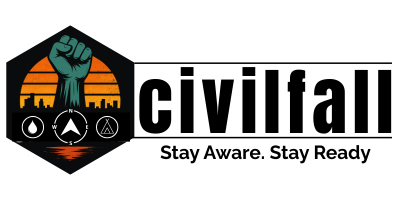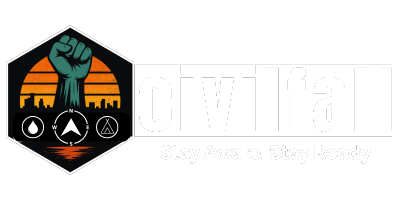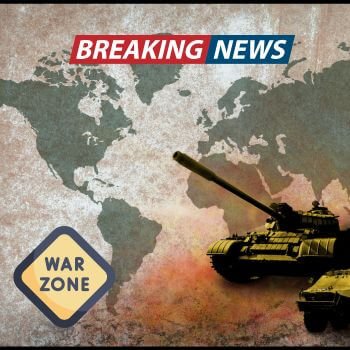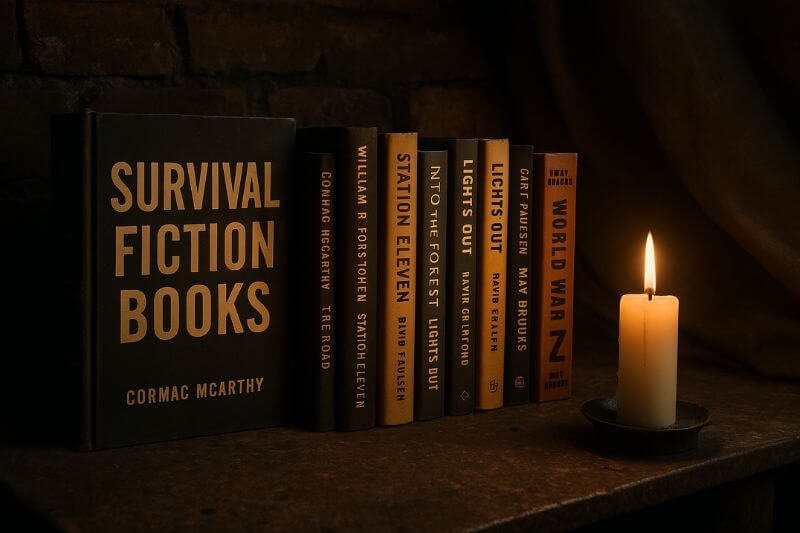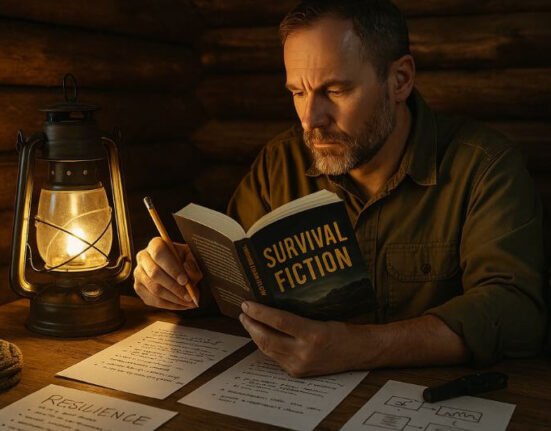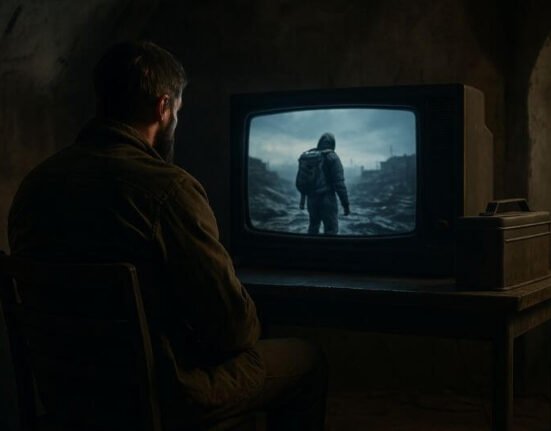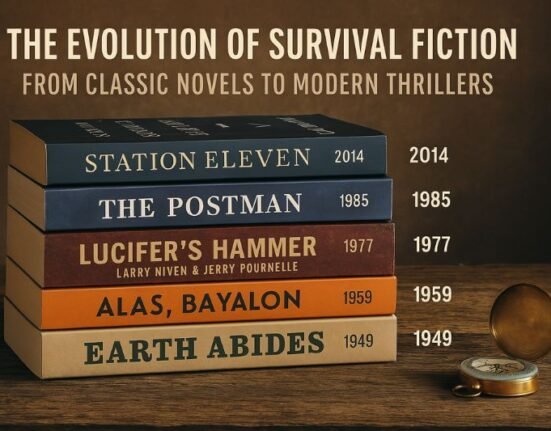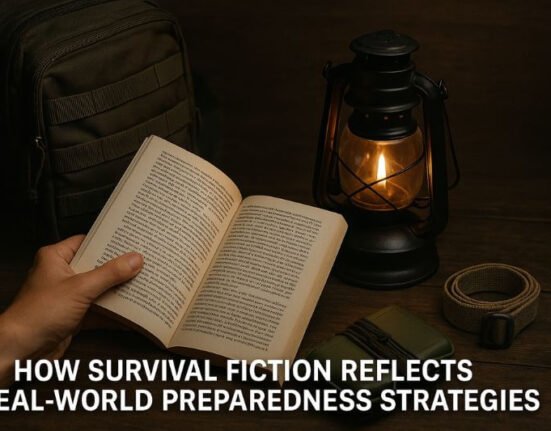Survival fiction books grip readers not just with thrill and suspense, but with something more primal: the echo of real danger, real fear, and real hope. From isolated wildernesses to post-apocalyptic wastelands, these stories awaken a basic instinct — the need to adapt, endure, and survive.
This genre speaks directly to our survivalist mindset. It doesn’t merely entertain; it prepares. When you read about a character foraging for food, defending a shelter, or overcoming societal collapse, you’re not just turning pages — you’re learning, analyzing, projecting yourself into crisis.
Today, in an uncertain world of pandemics, disasters, and blackouts, survival fiction is no longer niche — it’s becoming essential reading.
🔎 What Makes a Great Survival Fiction Book?
Not all thrillers are survival fiction. And not all survival fiction is good survival fiction.
Here are the core elements that define this genre:
- Isolation or collapse of systems (communication, government, supply chains)
- Resource scarcity (food, water, power, medicine)
- Threats (natural, human, technological, or biological)
- Psychological pressure (loneliness, trauma, moral dilemmas)
- Adaptation and resilience
Great books in this genre don’t just show survival — they teach it, through vivid narrative, emotional realism, and decision-making under pressure.
As preppers, homesteaders, or just alert readers, we extract lessons from every fictional collapse.
🔥 The Top 10 Survival Fiction Books You Should Read Right Now
Each of the books below was selected for its realism, emotional depth, and practical insights. These are not just stories — they are mental survival drills.
1. “The Road” by Cormac McCarthy
Post-apocalyptic survival in its rawest form.
- Theme: A father and son navigate a burned-out America after an undefined global catastrophe.
- Prepper Insight: The psychological toll of long-term survival — how to maintain purpose when hope is fading.
- Quote: “You have to carry the fire.”
2. “One Second After” by William R. Forstchen
The terrifying impact of an EMP strike on the United States.
- Theme: A small town faces starvation, violence, and breakdown after the power grid is destroyed.
- Prepper Insight: Realistic scenarios for power loss, medicine shortage, and community defense.
- Notable Fact: Recommended by military experts and even members of Congress.
3. “Alas, Babylon” by Pat Frank
A Cold War-era classic that remains alarmingly relevant.
- Theme: Nuclear war devastates America, leaving survivors to rebuild with limited resources.
- Prepper Insight: Community resilience, bartering systems, and water purification.
- Pro Tip: Pay attention to how neighbors form alliances or turn against each other.
4. “Station Eleven” by Emily St. John Mandel
An artistic, layered view of life after a pandemic wipes out 99% of humanity.
- Theme: Survival through art, memory, and shifting communities.
- Prepper Insight: The importance of psychological resilience and cultural continuity.
- Note: Less tactical, more emotional — but still powerful.
5. “Into the Forest” by Jean Hegland
Two sisters survive alone in a collapsing society, deep in the woods.
Bonus: Strong female leads navigating realistic challenges.
Theme: A quiet collapse: fuel shortages, economic downfall, grid failure.
Prepper Insight: Bushcraft, food preservation, menstruation and women’s health off-grid.
6. “Lights Out” by David Crawford
Civilization collapses after a total power outage — and suburban America turns feral.
- Theme: EMP attack disables all electronics. A community must rebuild from scratch.
- Prepper Insight: Tactical defense, perimeter security, barter economy, leadership under pressure.
- Quote: “We’re on our own. Nobody is coming to save us.”
7. “The Dog Stars” by Peter Heller
A beautifully written, post-pandemic survival story full of solitude and silent tension.
- Theme: A man lives alone at an abandoned airstrip after a deadly flu decimates the world.
- Prepper Insight: Isolation, trauma recovery, and making peace with uncertainty.
- Literary Bonus: This one reads like poetry at the end of the world.
8. “World War Z” by Max Brooks
Zombie apocalypse meets global sociology. Surprisingly grounded and deeply researched.
- Theme: Oral history of a worldwide zombie outbreak and the responses of nations.
- Prepper Insight: Logistics, supply chains, psychological operations, and community planning.
- Notable: Even used in U.S. military training scenarios for strategic thinking.
9. “The Stand” by Stephen King
A pandemic wipes out most of humanity. Good vs. evil plays out in a shattered world.
- Theme: A supernatural spin on survival, but still filled with relevant tactical lessons.
- Prepper Insight: Group dynamics, spiritual morale, and long-term community building.
- Bonus: Epic in scope — an immersive survival journey.
10. “Hatchet” by Gary Paulsen
Not post-apocalyptic, but a core classic of wilderness survival.
- Theme: A 13-year-old boy survives alone in the Canadian wilderness after a plane crash.
- Prepper Insight: Fire starting, food foraging, shelter building — raw, real, and unforgettable.
- Note: A must-read for teens and adults alike.
📊 Comparison Table – Survival Lessons from Fiction
| Book Title | Core Threat | Survival Focus | Prepper Takeaway |
|---|---|---|---|
| The Road | Undefined Doom | Psychological survival | Hope as a survival tool |
| One Second After | EMP | Community rebuilding | Medicine, food, defense |
| Alas, Babylon | Nuclear War | Social cohesion | Barter, hygiene, water systems |
| Into the Forest | Societal decline | Bushcraft and adaptation | Gender-specific challenges |
| Hatchet | Crash/Lost | Wilderness skills | Fire, food, shelter from scratch |
| Lights Out | EMP | Tactical defense | Local organization and leadership |
| World War Z | Global Outbreak | Systems analysis | Strategic planning, logistics |
| The Stand | Pandemic + Moral | Morality & purpose | Faith, charisma, group vision |
| The Dog Stars | Flu Pandemic | Emotional coping | Solitude, self-reflection, trauma response |
| Station Eleven | Pandemic | Cultural memory | Resilience through meaning |
🧠 What Fiction Can Teach Better Than Manuals
Reading survival fiction books isn’t a waste of time — it’s scenario training in disguise.
While manuals teach what to do, fiction teaches how it feels, how people react, and what happens when everything goes wrong despite your best plans.
Fictional stories allow us to:
- Practice empathy in a collapse scenario
- Visualize moral dilemmas (steal or starve?)
- Understand how fear, hope, and trauma shape survival
- Explore “what if” from safe psychological distance
As preppers, this is gold. Fiction lets us mentally walk through collapse — before it’s real.
🧭 Why You Should Add These Books to Your Survival Kit
Whether you’re a seasoned prepper or a curious reader, survival fiction books offer more than escapism — they offer mental conditioning.
They make you think:
- What would I do in this situation?
- Could I lead, adapt, or endure?
- Who would I become when everything falls apart?
Fiction reaches where training manuals can’t: your gut, your moral compass, and your ability to stay human in chaos.
Reading these stories prepares your mindset, trains your resilience, and fuels your imagination for future scenarios.
If knowledge is power, then survival fiction is fuel for your psychological arsenal.
✅ Ready to Take the Next Step?
📚 Don’t stop here.
→ Download our free “Mental Prepping Workbook” to reflect on the survival decisions made by fictional characters — and how you would act in the same situation.
→ Explore more in our Survival Mindset section.
→ Or check out our analysis of Bug Out Strategy featured in both fiction and real-life planning.
🧠 Train your instincts while feeding your imagination.
❓ Frequently Asked Questions (FAQ)
Q: Are survival fiction books realistic enough to help in real life?
Yes — many are researched extensively or even written by veterans, survivalists, or experts. While not manuals, they provide scenario exposure and critical thinking practice. Books like One Second After and Lights Out are even used in academic and military circles.
Q: Which book is the best to start with for beginners?
Start with “One Second After” for practical insight, or “The Road” for emotional impact. If you prefer cinematic pacing, “Lights Out” is a page-turner.
Q: Can young readers learn survival skills from fiction?
Absolutely. Books like “Hatchet” are ideal for younger audiences and teach basic wilderness skills. Fiction also builds problem-solving, empathy, and mental resilience.
Q: Is survival fiction the same as dystopian fiction?
Not always. Survival fiction focuses on individual or group adaptation during a crisis, while dystopian fiction often explores systemic oppression or control after collapse. The overlap exists, but their focus is different.
Q: Why is survival fiction becoming more popular?
Because real-world uncertainty is rising — pandemics, cyberattacks, climate events, geopolitical instability. People are looking for meaning, and fiction helps them explore “what if” in emotionally safe, yet realistic ways.
